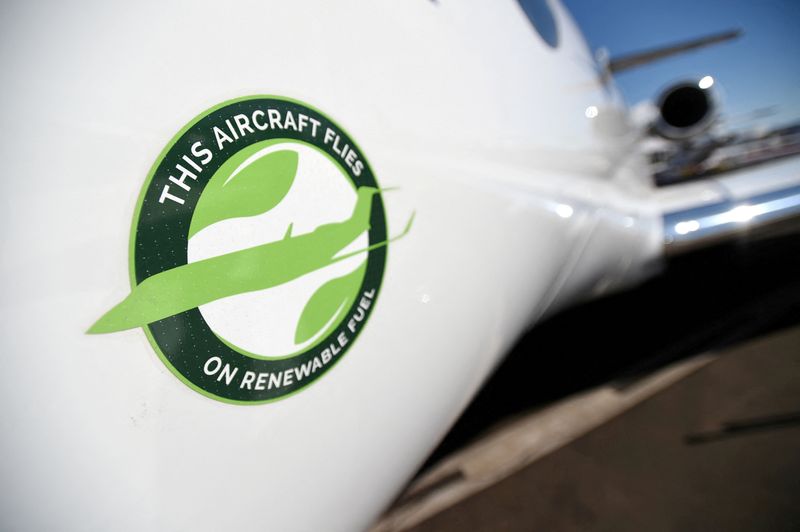By Stephanie Kelly
NEW YORK (Reuters) - The U.S. ethanol industry is lobbying the Biden administration to ensure lower-carbon aviation fuel made from ethanol will qualify for subsidies under the Inflation Reduction Act, arguing such provisions are crucial to meeting U.S. climate goals.
The campaign reflects the ethanol industry's desire to expand into aviation following years of stagnant demand for the corn-based fuel as an ingredient in gasoline, and projections that motor fuel demand will fall in the future due to better efficiency and the ascent of electric cars.
"Over the last 18 months, there's been a growing recognition in our industry that long-term you've got to be looking at new uses and new markets and nontraditional applications for ethanol if we're going to continue to grow our industry and its value," said Geoff Cooper, president of the Renewable Fuels Association, one of the organizations involved in the push.
Sustainable aviation fuel (SAF) is considered vital to decarbonizing the hard-to-electrify airplane industry and the Biden administration is targeting at least 3 billion gallons (11.4 billion liters) of SAF production per year in the United States by 2030 as part of its broader push to fight climate change.
At issue is a requirement in the Biden administration's IRA package, signed into law last year, that SAF yield a 50% reduction in lifecycle emissions compared with petroleum-based jet fuel before it can qualify for a $1.25 tax credit.
The lifecycle emissions impact of SAF can vary widely depending on the feedstock that producers use to make it, which can include a variety of substances ranging from soybean oil, to used cooking oil and animal fat.
Different methodologies to calculate the emissions of SAF can also yield different results.
The ethanol industry is asking the administration to use a methodology developed by the Department of Energy called GREET that shows ethanol to have a lighter carbon footprint as an SAF feedstock than does the methodology used by the International Civil Aviation Organization, which is mentioned in the IRA.
A coalition of ethanol industry representatives and allies in the airlines industry, known as the "SAF BTC Coalition," wrote to the Treasury Department in February asking that the administration use the Department of Energy methodology.
The coalition includes the Renewable Fuels Association, Growth Energy, United Airlines Holdings (NASDAQ:UAL) Inc, Delta Air Lines Inc (NYSE:DAL), and SAF producers LanzaJet Inc and Gevo (NASDAQ:GEVO) Inc.
Cooper said the RFA has also had numerous conversations across the Biden administration, including with the Department of Agriculture, the Treasury Department and with the Federal Aviation Administration about ethanol as a feedstock for SAF, and specifically around ethanol's carbon intensity.
The effort mirrors ethanol industry lobbying over emissions modeling during the creation of the Renewable Fuel Standard roughly 15 years ago. That policy, which now mandates billions of gallons of ethanol and other biofuels be blended into the nation’s fuel pool, also requires a reduction in carbon intensity compared to petroleum-based fuels.
HANDFUL OF PROJECTS
Ethanol groups say that their supply chain, which already produces and transports huge volumes of ethanol per year, thanks to the RFS, would be readily available to help boost production of SAF to meet the administration's goals.
But so far, only a handful of ethanol-to-SAF projects have been proposed.
LanzaJet, for example, is building in Georgia an alcohol-to-jet production facility using ethanol as a feedstock which is due to be completed in 2023, and which the company says would be the world's first facility of its kind.
The project would produce 10 million gallons of SAF and renewable diesel per year – a tiny fraction of the roughly 24.7 billion gallons of petroleum-based jet fuel now produced in the U.S. annually.

Gevo has said it expects to develop, own, and operate ethanol-to-jet plants to produce SAF. The company has agreements with Delta Air Lines and American Airlines (NASDAQ:AAL) Group Inc to supply each with tens of millions of gallons of SAF per year for several years starting in 2026.
Engineering and aerospace giant Honeywell International Inc (NASDAQ:HON) has also announced a new ethanol-to-jet fuel processing technology.